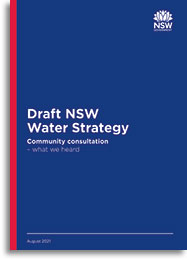The NSW Government has developed a 20-year NSW Water Strategy as part of a broader program to improve resilience of the state’s water resources. A draft of the NSW Water Strategy was on public exhibition from 15 February, 2021 to 28 March, 2021, attracting 130 community and stakeholder submissions.
Recordings of webinar sessions
Download the presentation or watch the webinars.
Presentation
A presentation on the NSW water strategy covered off the following topics with stakeholders; objective, development, how to have your say and next steps.
Download the presentation (PDF. 2,000KB)Watch the webinar
15 March 2021 – An overview of the development of the draft strategy, its priorities, the timelines for the final strategy and more information about the submission process.
Watch the webinar
25 February 2021 – an overview of the development of the draft strategy, its priorities, the timelines for the final strategy and more information about the submission process.
How we engaged
The department engaged with a wide range of individuals and organisations, many of which provided written or verbal feedback with diverse suggestions that were considered during the development of the final NSW Water Strategy and Implementation Plan.
Through webinars, meetings and submission, we engaged with:

| 107 Individuals | 
| 10 Community organisations |

| 39 Local Government organisations in NSW | 
| 5 Federal government agencies |

| 19 Industry organisations | 
| 6 First Nations / Aboriginal organisations |

| 11 Environmental organisations | 
| 39 Businesses / business organisations |

| 5 Non-NSW State Government agencies | 
| 5 Other submitters |
What we heard: key themes
Feedback indicated there is widespread support for the NSW Water Strategy. Stakeholders were mostly positive about the initiative and its role in supporting strategic water planning, management and outcomes for NSW. Key themes were:
Support for the Strategy
- There is strong support for the strategy’s direction-setting agenda
- Many stakeholders want to see alignment and cohesion across policies, strategies and regulation from a local to a national level, seeing it as an opportunity to streamline regulation
- Stakeholders want more detail about the strategy’s implementation, and seek an action plan with key performance indicators
- Stakeholders want a guarantee the strategy will be implemented effectively and without adding further financial or regulatory imposts to water users
Water efficiency and productivity
- There was strong support for water efficiency measures and demand management mechanisms – new technologies and approaches are seen as an opportunity
- There were mixed views on the issue of water efficiency and productivity for industry – a desire for a reduction in intensive usage was balanced by concerns about secure access to supply in the future
- Stakeholders see water utilities as essential for delivering resilience and prosperity, and want them to have additional funding, resourcing and support
- Opportunity for First Nations / Aboriginal employment in the water sector should be improved
First Nations / Aboriginal water rights and access
- There is strong support for First Nations / Aboriginal water rights and access, and greater engagement and participation with those people – empowering ongoing participation and management was seen as essential
- Recognising better outcomes for Aboriginal People and opportunities across all priorities in the Strategy was supported
- In addition, the department should:
- Better understand how First Nations / Aboriginal People can be engaged in water planning and management
- Develop the Aboriginal Water Strategy in the context of the Regional Water Strategies, Metropolitan water strategies and NSW Water Strategy
- Recognise and understand Native Title rights and how they relate to water
Water security and infrastructure
- Stakeholders were concerned about water security, with many desiring a coordinated approach to this issue and drought planning
- While there was discussion regarding infrastructure, there was little support for the construction of additional dams
- Many stakeholders felt water infrastructure should have a higher priority within the strategy, particularly in relation to its use in
delivering identified initiatives - Stakeholders highlighted the importance of funding to deliver infrastructure needed in the regions to assist with water planning and
security - There was support for water supply diversification, particularly the use of recycled water
- Stakeholders want to see greater recognition of water users as well as the social, cultural and economic importance of water security for regional areas
Environment and connectivity
- Stakeholders were concerned with ecosystem health and water quality
- There is a desire for greater emphasis and action on connectivity within the strategy
- Stakeholders supported climate change considerations within the strategy - particularly in relation to modelling, decision-making and modern water management techniques. Furthermore, stakeholders felt water allocations should be informed by an improved understanding of the impacts of climate change
- The NSW Water Quality Objectives should incorporate the values of First Nations / Aboriginal People
Data and information
- There was strong support for wider information sharing and collaboration to build community confidence, increase water literacy and improve decision-making
- The need for more transparency was highlighted
- Stakeholders wanted to see information and modelling made public and/or shared with local water utilities/local government, and believe the NSW Government should employ and share long-range research
Next steps: monitoring, evaluation, reporting and improvement
Feedback on the draft NSW Water Strategy was used by the department to update the final strategy and inform the development of an implementation plan that sets out how the actions in the strategy will be delivered for the next 12 months. We will report on progress against actions in the NSW Water Strategy and update the Implementation Plan annually.
To ensure that implementation is achieving the priorities and actions of the strategy, we are establishing an integrated framework for reviewing and reporting against the NSW Water Strategy, the 12 regional water strategies and two metropolitan water strategies. We will formally evaluate, review and update the NSW Water Strategy at least every five years.

